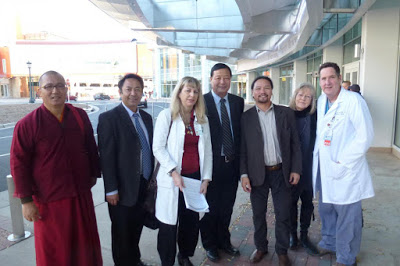by MICHAEL WOODHEAD
When a Chinese minister says a new arrangement is a “win-win situation” you know have lost. And so it is with China’s new NGO Management Law, which is in effect a piece of highly restrictive legislation that will drastically curtail the activities of health NGOs, put them under the direct control of relevant ministries and subject them to tight monitoring and suppression by the Public Security Bureau.
In what seem to a parallel with the widespread crackdown on civil and legal rights with the mass arrest of lawyers, Xi Jinping has launched an aggressive campaign to strike against the increasing activities of health NGOs. Many of the activities of groups such as Oxfam and Project Hope may seem relatively inocuous to westerners – but programs focused on poverty alleviation, disability awareness, environmental health and promoting reproductive health, and offering health services to minorities are a highly sensitive subject for China’s supposedly Communist administration. You only have to look at the crackdown on HIV organisations to see how the authorities react to any imaginary threat to their authority or the questioning of it.
Perhaps the authorities fear the so called “Third Sector” groups will undermine their legitimacy by highlighting the failures of the government to provide basic services. Or perhaps they are just paranoid, with ministers already on record as saying that the NGOs claims to be about “Big Society, Small Government” are an underhand way of bringing about social revolution – a kind of Velvet Revolution in scrubs.
Whatever the reasons, the new conditions are harsh. The new law for regulating NGOs specifies that
- At least 50% of staff must be local Chinese,
- All NGOs must register and gain permission for all programs in advance,
- NGOs must put themselves under the control of the relevant health ministry and departments.
- Programs will only be permitted if they are in line with Chinese government policies.
- NGOs must also clear all their activities with the PSB and make all their documents and staff subject to instant inspection and ongoing monitoring.
Of course, this is not how the NGO Management Law has been reported in official media. On the contrary, it has been described as a measure that finally recognises the high value of NGO work and seeks to bolster the status of such efforts. The Chinese government said the new law it would provide better management “and strive to provide more convenience and service, better environment and security.”
A meeting held to launch the new regulations was told that China “welcomed long-term friendly exchanges and cooperation, and that foreign NGOs brought China international capital, advanced technology and management experience, and their activities were conducive to the development of Chinese science and technology, people’s livelihood, welfare and other aspects of business.”
However, it was notable that the launch meeting was chaired by Minister of Public Security Guo Shengkun rather than ministers responsible health or development. Guo said that China placed great importance on the work of health NGOs and wanted to further encourage them.
The security chief also warned that NGOs must strictly obey Chinese laws and regulations, and the new NGO regulation was needed to ensure that NGO programs were conducted according to their stated purpose and “in an orderly manner” – that’s Chinese official speak for not doing anything that is vaguely beyond government control.
Another speaker more pointedly warned against NGO “trickery”, using the Chinese idiom of “displaying a sheep’s head but selling dog meat” (“挂羊头卖狗肉”)
However NGO representatives and diplomats especially from the EU have strongly criticised the wide ranging and oppressive conditions in the new law. They say health NGOs already find it difficult to operate in China and the new law will make it even harder. The law curtails almost all the rights and functions of NGOs and their staff, and makes them subject to vague but sweeping and draconian powers of the PSB and ministries.
An EU representative said the new laws will impose an excessively heavy burden in terms of administrative, financial and personnel requirements on NGOs and greatly increase operating costs of the organizations, making their China programs unviable.
The meeting heard that there were about 1000 NGOs with long term programs in China and as many as 7000 with short term or one off aid programs. How they will be affected by the new measures remains to be seen.
